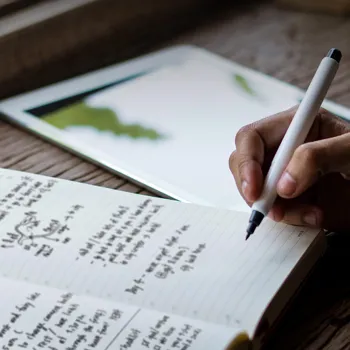Unlock the Secret to Happiness: Embrace Gratitude & 7 Daily Exercises. Dive into how gratitude can transform your life!
In the hustle and bustle of Indian life, where we are constantly juggling family responsibilities,
career aspirations, and social expectations, it's easy to get caught up in what we lack.

We often find ourselves yearning for more – a bigger house, a better job, a shinier phone, or simply, a less stressful existence. However, amidst this constant pursuit, we often overlook the simple yet profound power of gratitude.
Practicing gratitude, or actively appreciating the good things in our lives, can be a game-changer for our mental, emotional, and even physical well-being. It’s a simple shift in perspective that can bring immense joy and contentment, even when faced with challenges.
Let's explore why gratitude is important and delve into seven easy daily exercises that can help you cultivate a more grateful heart.
Gratitude's impact on happiness, relationships, and well-being
Gratitude isn’t just some abstract concept or a fleeting feeling; it's a powerful emotion that has a tangible impact on our brains and bodies. Studies have shown that practicing gratitude can increase levels of happiness and reduce feelings of depression and anxiety.

When we focus on the positive aspects of our lives, our brains release dopamine and serotonin, neurotransmitters associated with pleasure and well-being. This, in turn, improves our mood, reduces stress, and promotes a sense of overall contentment.
Moreover, gratitude can strengthen our relationships. Expressing appreciation to loved ones fostersconnection, builds trust, and enhances feelings of love and belonging.
In a collectivist society like India, where family and community ties are highly valued, gratitude can play a crucial role in maintaining harmonious relationships.
When we acknowledge and appreciate the efforts of others, we create a cycle of positive reinforcement, encouraging them to continue their acts of kindness and strengthening the bonds that hold us together.
Cultivate gratitude through journaling, thanking others, and savoring positive moments
One of the simplest and most effective ways to cultivate gratitude is by keeping a gratitude journal. Dedicate a few minutes each day, perhaps before going to bed or first thing in the morning, to write down three to five things you're grateful for.

These can be big or small, from a loving family to a delicious cup of chai. The key is to be specific and to focus on the positive emotions associated with each item. Another powerful exercise is to express your gratitude directly to others.
Take the time to thank people who have made a difference in your life, whether it's a family member, a friend, a colleague, or even a stranger who offered you a helping hand. A simple “thank you” can go a long way in brightening someone's day and strengthening your relationship with them.
You can express your gratitude verbally, through a handwritten note, or even with a small gift or gesture. Consciously savoring positive moments is another excellent way to cultivate gratitude. Often, we rush through life, failing to fully appreciate the good things that happen to us.
Take the time to slow down and truly savor positive experiences, whether it's a beautiful sunset, a delicious meal, or a heartfelt conversation with a loved one. Pay attention to the details, engage your senses, and fully immerse yourself in the moment.
Practicing mindful gratitude in daily life amid challenges
Practicing mindful gratitude is about being present and aware of the good things in your life, even amidst challenges. It involves taking a moment each day to reflect on the things you're grateful for, without judgment or expectation.

A simple exercise is to close your eyes, take a few deep breaths, and focus on a specific person, experience, or thing that you appreciate. Allow yourself to feel the positive emotions associated with it, and let gratitude wash over you.
Another powerful practice is to reframe negative thoughts and situations. Instead of focusing on what went wrong, try to find the positive aspects or lessons learned. For example, if you faced a setback at work, you could be grateful for the opportunity to learn and grow from the experience.
Or, if you encountered a challenging situation in your personal life, you could be grateful for the resilience and strength that you developed in overcoming it. Reframing negative experiences helps you shift your perspective and find gratitude even in difficult times.
Expressing gratitude through acts of kindness is a wonderful way to spread positivity and strengthen your connection with others.
Gratitude walks and meditations enhance connection with nature and appreciation for life
Gratitude walks can be a refreshing way to connect with nature and appreciate the beauty around you. As you walk, pay attention to the sights, sounds, and smells of your environment, and consciously acknowledge the things you're grateful for.

This could be the warmth of the sun on your skin, the chirping of birds, the beauty of the trees, or the simple joy of being able to move your body. Gratitude meditations involve focusing your attention on feelings of gratitude and appreciation.
There are many guided meditation scripts available online that can help you cultivate these emotions. During the meditation, visualize the people, experiences, and things you're grateful for, and allow yourself to feel the positive emotions associated with them.
Remember that gratitude is not just a one-time act, but a continuous practice. The more you cultivate it, the more it will become a natural part of your life. Start with small steps, be patient with yourself, and embrace the journey of gratitude with an open heart.
Gratitude in Indian culture enhances well-being and spiritual connection
In the Indian context, where spirituality and a sense of interconnectedness are deeply ingrained in our culture, gratitude can be a particularly powerful tool for enhancing well-being.
Many Indian traditions emphasize the importance of giving thanks for the blessings in our lives, whether it's through prayers, rituals, or acts of service. Cultivating gratitude can help us connect with our spiritual roots and find deeper meaning and purpose in our lives.
Moreover, gratitude can help us appreciate the richness and diversity of Indian culture. From the vibrant festivals to the delicious food to the warm hospitality of the people, there is so much to be grateful for in India.
By focusing on the positive aspects of our culture, we can strengthen our sense of national pride and promote a more harmonious and inclusive society.
Remember, gratitude is not about ignoring the challenges and difficulties we face, but rather about choosing to focus on the good things in our lives, even amidst adversity.
It's about recognizing that we have much to be thankful for, and that even small blessings can bring immense joy and contentment.
Embrace gratitude daily for a happier, more fulfilling life
So, let’s embrace gratitude as more than just a fleeting emotion; but rather, a way of life. By incorporating these seven daily exercises into your routine, you can cultivate a more grateful heart, enhance your well-being, and experience the transformative power of appreciation.

Remember that gratitude is a journey, not a destination. Be patient with yourself, celebrate your progress, and embrace the joy of living a life filled with thankfulness. The benefits of gratitude are profound and far-reaching.
They can improve your mental and emotional health, strengthen your relationships, and enhance your overall sense of well-being. So, start today and discover the secret ingredient to a happier, more fulfilling life; it's gratitude.
Make small shifts, and experience the profound improvements gratitude brings to your life!











